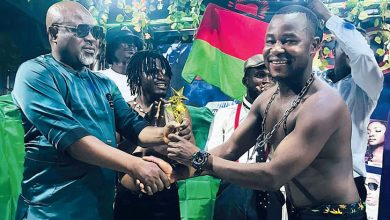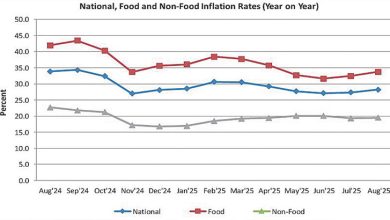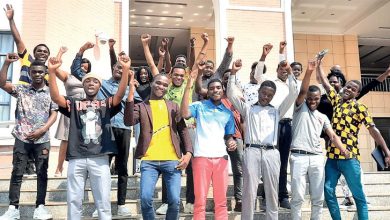Media as a viable tool to holding governments accountable
Amina gazed out at the parched landscape, her eyes tracing the cracks in the earth that seemed to mirror the cracks in her family’s fragile existence.
She saw not just the cracks in the earth, but also the cracks in the system that has long marginalised women and girls.

As a single mother in a rural village, she knew first-hand the devastating impact of climate change on female-headed households such as hers.
The scorching heat and unpredictable floods had become a harsh reality, eroding their meagre income and threatening their very survival.
Statistics were stark: female-headed households such as Amina’s lost eight percent more income to heat stress and three percent more to floods compared to male-headed households, according to UN Women’s Feminist Action for Climate Justice Action coalition.
It its presentation at a two-day Generation Equality Media and Commitment Makers Fest by UN Women in Nairobi, Kenya from March 27 to 28, the coalition revealed that a staggering $37 billion and $16 billion, respectively, were lost across low- and middle-income countries due to heat stress and floods.
It said a 1°C increase in average temperatures would only exacerbate the disparity, with female-headed households facing a 34 percent greater loss in total income.
Amina’s story was not unique. Women and girls worldwide bear the brunt of climate-related disasters, their socio-economic, political and cultural inequalities rendering them more vulnerable.
She and countless others could create a brighter future, one where climate change was not a distant threat, but a challenge to be met with courage, determination, and collective action.
Daystar University School of Communication Associate Dean and Kenya Editors Guild innovation committee member Dr. Lydia Ouma Radoli said climate change and gender equality are interconnected.
“Women, particularly in the Global South, are disproportionately affected by climate-related disasters due to socio-economic, political and cultural inequalities,” she said.
Radoli said the media often framed climate change as a distant threat, but for Amina and countless others, it was a harsh reality that demanded action.
The lecturer also attributed the underreporting of how climate affects women, LGBTQ+ communities and other marginalised genders to lack of gender-disaggregated data.
UN Women recognises the role media plays in shaping narratives, influencing public opinion and holding institutions accountable; hence, the media fest.
Generation Equality Eastern and Southern Africa Regional Office project coordination specialist Aijamal Duishebaeva said the media is a powerful force in shaping narratives, influencing public opinion and holding institutions accountable.
She said in UN Women’s effort to advance gender equality, the media has the unique ability to spotlight critical issues, amplify marginalised voices and challenge harmful stereotypes.
“Yet, despite this transformative potential, the media’s role in advancing gender equality remains underutilised,” she said.
A call to action
Generation Equality Media Fest connected traditional media, digital content creators and commitment makers from East and Southern Africa to evaluate progress, address ongoing challenges and renew actionable commitments.
Duishebaeva added: “With its unique power of convening, accountability and multi-stakeholder collaboration, the media fest can serve as a strong platform for building more structured partnerships with the media.”
She also noted that engaging media as partners and commitment makers through Generation Equality can amplify gender equality issues, promote responsible reporting and foster a culture of gender-sensitive journalism.
The event recognised the significance of 2025, a landmark year for gender equality, marking; the 13th anniversary of the Fourth World Conference on Women and the adoption of the Beijing Declaration and Platform for Action (BDPfA), the 25th anniversary of UN Resolution 1325, review progress on Sustainable Development Goal (SDG) 5 at the High-Level Political Forum, the 15-year anniversary of UN Women’s 15th anniversary and Youth, Peace and Security agenda’s 10th anniversary.
In marking a pivotal year for the global gender equality agenda, the Media Fest provided a unique platform to strengthen the critical role of media in advancing gender equality with a focus on storytelling, collaboration and skill-building.
The Generation Equality campaign also demands equal pay, Equal sharing of unpaid care and domestic work, an end to sexual harassment and violence against women and girls;healthcare services that respond to their needs and equal participation in political life and decision-making.
The initiative emerged from the Beijing+25 review process to accelerate the BDPfA and SDGs implementation.
It also plays a key role in driving attention to greater accountability, resourcing and commitments leading up to Beijing+30 and beyond.
According to asiapacific.unwomen.org, UN Women stands at the centre of mobilising governments and civil societies to keep the BDPfA promises to all of society.
It was adopted by 189 governments. Over 90 Partners have joined the Action Coalition Leadership Structures with 282 commitments in East and Southern Africa, 125 commitment makers in East and Southern Africa.
About 53 percent policy, 65 percent advocacy and 60 percent commitments are being implemented in Sub-Africa.
It tackles gender-based violence, economic justice and rights, feminist movement and leadership, technology and innovation for gender equality, feminist action for climate justice and bodily autonomy and sexual and reproductive health and rights.
At the heart of Generation Equality is a collection of six multistakeholder, inter-generational thematic action coalitions and a Compact on Women, Peace and Security and Humanitarian Action (WPS-HA) led by stakeholders including civil society, youth, governments, the UN system, the private sector and philanthropies.





